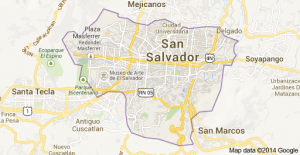SAN SALVADOR, El Salvador – Authorities in El Salvador began the final count of votes Monday in a presidential runoff whose razor-close margin led the conservative challenger to announce his party is on “a war footing” to challenge alleged fraud.
Former leftist guerrilla fighter Salvador Sanchez Ceren of the Farabundo Marti National Liberation Front held a thin lead in a race with high stakes for a country that saw 76,000 people killed in its 1980-92 civil war.
The margin of 6,634 votes was just over 0.2 per cent of the approximately 3 million ballots cast – but Electoral Tribunal president Eugenio Chicas said that was likely irreversible.
Chicas said votes would be recounted only at about 21 polling places where problems were detected or alleged. The average polling place in the country had about 285 votes.
“The numbers aren’t big enough to overcome the difference, but we should wait for the final count,” Chicas said Monday. “The 4,000 challenged votes won’t make up the difference.”
Norman Quijano, candidate of the conservative Nationalist Republican Alliance, had already denounced the electoral tribunal as “sold out to the dictatorship … We knew it favoured the Farabundo Marti.” On Monday, the party known as ARENA asked the country’s attorney general to consider stepping in to oversee the recount and it officially petitioned electoral authorities to do a vote-by-vote recount.
Electoral Tribunal magistrates rejected ARENA’s fraud claims and pointed out a statement by the Organization of American States saying it was satisfied with how the election was conducted.
We “express satisfaction for the tranquility and civic spirit of the elections,” the OAS said. It urged politicians to stay calm until electoral authorities declare a winner.
Quijano, a former mayor of the capital, used language with eerie echoes of the country’s violent past. He said his party was on “a war footing” and vowed “to fight with our lives, if necessary” to defend what he claimed was his victory, and suggested the army could play a role in upholding it.
Military leaders made no comment about the vote.
Sanchez Ceren also claimed to have won.
“The men and women of El Salvador are the ones who decide, and if you don’t accept the result, you are violating the will of the people,” Sanchez Ceren said. “I say to my adversary, to his party, that my administration will welcome them with open arms, so that together we can build a new country.”
ARENA, a party long identified with the country’s landed elite, governed the country until losing in 2009 to journalist Mauricio Funes, who ran on the banner of the former rebels known as the FMLN, though he had never fought for them.
The FMLN, behind party stalwart Sanchez Ceren, seemed to be headed for certain victory in the weeks leading up to the election, with opinion polls giving him a 10- to 18-percentage point lead in his quest to become the first actual former guerrilla to lead the nation, though he promised to govern as a moderate.
But ARENA managed to make serious inroads with a campaign warning that the leftists might take the country on the course of Venezuela.
Roy Campos, president of the Consulta Mitofsky polling firm, said Quijano’s ads comparing the FMLN to Venezuela’s leftist leaders, protests and economic scarcity may have worked, creating a situation where some voters “felt El Salvador was in danger.”
“Venezuela was an important factor,” Campos said.
Marcos Rodriguez of the non-profit civic group Citizens’ Movement said, “The public reacted to a scare campaign … There was a recovery in the conservative vote, in the right-wing vote.”
Quijano’s support in the business sector may have also played a role. Some stores closed on election day and some restaurants offered free food to voters, which could have led to a higher turnout of more affluent voters.
Sanchez Ceren, 69, warned against any return to the violence of the past. “I want to say to all those who are inciting violence that they are on the wrong track. The people have decided to continue on the path of change, and the people cannot be stopped.”
Sanchez Ceren was a top rebel commander who helped negotiate the 1992 peace accords that ended El Salvador’s civil war, in which the United States supported the government against the FMLN to prevent communism from spreading in Latin America.
He campaigned on a promise to deepen the outgoing government’s popular social programs and govern as a moderate. He said he envisioned ruling like Uruguayan President Jose Mujica, also a former guerrilla who formed an inclusive government.
Quijano, 67, promised to crack down on rising gang violence.
